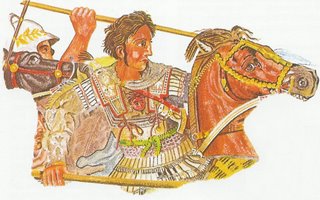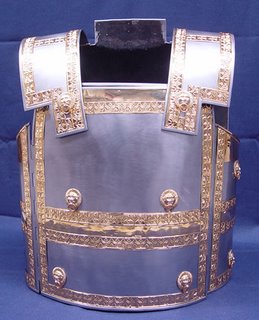EM World History
A blog where we write about history. Mostly military history and some political history. We will give our own opinions. If you don't like it, too bad!!!!!!!!!!! However, we will also include pure, genuine fact. Feel free to comment. We will tell about some things in great detail. Some things we'll cover lightly, and there's a ton of stuff we just don't know. Tell us if we get anything wrong. Enjoy!!
Monday, September 04, 2006
Glossaria Magna [pseudo-Latin]- Includes From Every Section
Here is the master glossary:
> Achaemenid Dynasty - Hakhāmanishiya in Old Persian. This line ruled Persia form its rise under Cyrus I until its fall under Darius III
> Ægean - a sea residing 'twixt Greece and modern Turkey
> Alcibiades - young Athenian leader during th aPeloponnesian War who defected tot he Spartan side
> Asia Minor - what is now Turkey
> aspis - the generic Greek word for "shield"
> Assembly - the ancient Athenian lawmaking council
> Assyrian Empire - An oppressive regime that was the largest of its time around the seventh century BC
> Athens - a still-surviving city in Greece that was founded in the Bronze Age
> Attica - the region around Athens and Thebes
> Babylon - an ancient city whose culture flourished in the late 3rd millenium BC
> Bactria - an ancient state that was where Afghanistan is now
> bell cuirass - eighth century BC bronze body armour
> Boeotia - small region northwest of Attica
> Boeotian shield - round shield with two strategically placed cutouts on the sides
> Bronze age - the late bronze age was between ca. 1600 and 1200 BC
> butt-spike - spike on the back end of a spear
> Corinth - a Greek city-state situated on the Peloponnesian Ithsmus
> Cleon - a ruler of Athens in the Peloponnesian War who died at the Battle of Amphipolis
> Cretan - of or pertaining to the island of Crete or its inhabitants
> Cyrus I - The first King of Persia
> Darius I - Emperor of Persia between 521 and 485 BC; arguably the greatest Persian king
> dathabam - 'tens'. Smallest division of a Persian army
> Dipylon shield - [see Boeotian shield]
> dory - probably the Greek word for "spear"
> Ethiopia - a region of Africa that was in contact with the European world in ancient times
> Euphrates - A river in the Mesopotamian region
> falcata - [see kopis]
> Gaugamela, Battle of - Alexander the Great's final victory over Emperor Darius III
> Græco-Persian War - The war that began around 500 BC with the Persian Emperor's invasion of the Greek mainland
> hazarabam - 'thousands'. Largest division of a Persian army
> Hellenic - of or pertaining to the Hellenes, or Greeks
> Hermes - Hellenic god of lots of stuff
> Hittites - an archaic people of Asia minor with an early knowledge of iron
> Homer - a Greek poet who may have lived in the 8th century BC
> hoplite - Hellenic part-time heavy infantry
> hoplon - an ancient Greek word meaning "tool"; later, "tool of war"
> Ionian Sea - the sea between Greece and Italy
> kern - Celtic skirmishers/light infantry
> kopis - Greek forward-curved sword
> Lagash - a city of the Sumerian civilization
> linen cuirass - somewhat flexible Greek armour made of stiff linen
> linothrax - [see linen cuirass]
> machaira - [see kopis]
> Marathon, Battle of - a decisive battle where the Athenians repelled the Persians
> Medes - The people of Media, who brought down the Assyrians, helped by the Babylonians
> Mesopotamia - the area that is now Iraq. Some of the first evidence of human agricultural civilization is here
> Minos - an ancient Greek culture centered on the island of Crete from 2500 - 1400 BC
> muscled cuirass - bronze (and later iron) Greek armor in the form of a muscled torso
> Mycenae - a powerful pre-Hellenic culture that dominated the Ægean between 1400 - 1000 BC
> Nicias - a ruler of Athens in the Peloponnesian War
> Ottoman Empire - a Turkish empire that was an important Muslim power in the Near East from its founding in 1299 to its fall in 1923
> Peloponnesian War- a war between the Athenians and their allies and the Spartans plus their allies. It began in 431 BC and ended in 404 BC with a decisive Spartan victory.
> Peloponnesus - the large peninsula in the south of Greece that is separated from the mainland by the Corinthian ithsmus
> pelta - crescent-shaped shield carried by Greek and Thracian light infantry
> peltast - Greek light infantry
> Pericles - ruler of Athens at the beginning of the Peloponnesian War
> pestilence - a plague, specifically the one that happened in 5th Century BC Athens
> Philippides - runner who told Athens of their victory at Marathon
> Phrygian cap - a cap, probably from the region of Phrygia
> phalanx - a dense rectangular block of soldiers armed with pikes and usually shields
> Piraeus - the port near Athens
> Salamis, Battle of - The naval battle between the Athenians and the Persians that resulted in the destruction of the entire Persian fleet
> sataba - 'hundreds'. The middle division of a Persian army
> satrapy - a Persian "fiefdom" of sorts, ruled by a satrap who owed allegiance to the Emperor of Persia
> Schliemann, Heinrich - Amateur archaeologist who uncovered the ancient sites of Troy, Mycenae, and Tiryns
> Scythians - A nomadic people who lived north and west of the Black Sea
> Sea peoples - raiders from the area of modern Israel who ravaged the coasts of Egypt in the time of the Old Kingdom
> Sicilian Expedition - ill-fated Athenian attempt to take Sicily from the Spartans
> spara - a large, leather shield
> sparabara - 'shieldbearer'. Persian mêlée infantry
> Sparta - a Greek city-state in the region of Lakonia on the Peloponnesus that was known for its legendary warriors
> Syracuse - large Greek settlement on the eastern coast of Sicily
> Thebes - Greek city-state in Boeotia
> Theban Sacred Band - fighting elite of Thebes, 100 men
> Thessaly - the great plain that dominates central Greece
> Thermopylae, Battle of - a Pyrrhic victory for the Persians against the Greeks
> Thrace - The region just to the west of the Black Sea, northeast of Macedonia
> Tigris - A river in the Mesopotamian region
> Troy - an ancient city in Asia Minor
> Tutankhamen - New Kingdom pharaoh whose tomb was discovered untouched by thieves
> Ur - a city of the Mesopotamian civilization
> veles - Roman skirmisher
> Xerxes I - Persian King who conquered most of Greece before finally being defeated
> xiphos - Greek shortsword


